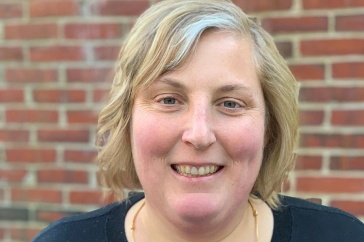UNH Archaeologist Receives Prestigious Carnegie Fellowship

Megan Howey, professor of anthropology at the University of New Hampshire, has been named a 2020 Andrew Carnegie Fellow.
DURHAM, N.H.—University of New Hampshire professor of anthropology Meghan Howey has been named a 2020 Andrew Carnegie Fellow. She is among just 27 scholars nationwide selected to receive the one of the country's most generous and most prestigious fellowships to advance research in the social sciences and humanities.
Fellows will receive $200,000 from the Carnegie Corporation to fund scholarly research and writing aimed at addressing some of important and enduring issues confronting our society. As a fellow, Howey will advance and expand her work on a multifaceted exploration of the socioecological “shock” of colonialism and the lasting imprint of colonial legacies in the current geological age.
“I am thrilled to see Professor Howey receive the recognition she deserves on a national stage,” said UNH Provost Wayne Jones. “The Carnegie Corporation’s recognition of the important research being done every day at public flagship institutions like UNH is a great honor.”
The fellowship will allow Howey to continue her work on the Great Bay Archaeological Survey (GBAS), a multi-year interdisciplinary and community-engaged research program that has found and excavated 17th and early 18th century residences (e.g., garrisons and homesteads) and natural resource extraction sites (e.g., sawmills) and amassed a systematic collection of early colonial artifacts, ecofacts, and geospatial data.
“Many climate scientists agree that, given the major impact of human activities on Earth and the atmosphere, we are living in a human-dominated geological age,” said Howey. “We are living through a threshold change in this time of COVID-19, and colonialism was also a major threshold change. My work looks at moments when the outcome of change like this was not completely foretold yet people were having to make decisions about how to interact in the “new” world they found themselves living in, how to intersect with each other and the environment. This had long lasting and often devastating consequences. Perhaps reflecting on our past can offer us some lessons as we make choices moving forward.”
“I am incredibly honored and humbled to receive this award,” said Howey. “This research approach presents a framework applicable to studies of socioecological threshold changes across the globe as well as a model for bringing diverse communities beyond the academy into ongoing discussions of what it means to be living in the current geological age. I believe this approach to socioecological systems turns the table on modern environmental management scales, resets baselines and provides information at local and regional spatial scales to reveal how modern ecosystems have been preconditioned by past experiences, including colonialism, which radically transformed people and place.”
Howey plans to publish her work into a broadly accessible book during her fellowship.
Howey is an anthropological archaeologist specializing in landscape archaeology and interdisciplinary approaches to deep-time coupled human natural systems. She received her bachelor’s degree from the University of Delaware and her master’s and doctoral degrees from the University of Michigan. She has conducted research in North America, Europe and East Africa. One of her major research projects has focused on Native American regional organization in the northern Great Lakes region in the period preceding European contact. She has explored how local communities construed and used ceremonial monument centers to facilitate economic, social and ideological interaction in this period. She also examines the critical role of food storage during this period. Howey is currently the James H. Hayes and Claire Short Hayes Professor of the Humanities and director of the Great Bay Archaeological Survey (GBAS), a community-engaged and interdisciplinary archaeology program.
“The pursuit of knowledge and the generation of ideas were critically important to Andrew Carnegie, whose mission is especially relevant today as our society confronts problems that have been greatly exacerbated by COVID-19,” said Vartan Gregorian, president of Carnegie Corporation of New York. “Fellows from earlier classes are actively addressing the coronavirus through their research on topics such as its impact on rural America, government authority during a pandemic and ways in which different countries address infectious diseases. The work of this exemplary class of 2020 will also be of service across a range of other crucial issues.”
The University of New Hampshire inspires innovation and transforms lives in our state, nation and world. More than 16,000 students from all 50 states and 71 countries engage with an award-winning faculty in top-ranked programs in business, engineering, law, health and human services, liberal arts and the sciences across more than 200 programs of study. As one of the nation’s highest-performing research universities, UNH partners with NASA, NOAA, NSF and NIH, and receives more than $110 million in competitive external funding every year to further explore and define the frontiers of land, sea and space.
PHOTO AVAILABLE FOR DOWNLOAD:
https://www.unh.edu/unhtoday/sites/default/files/media/howey_meghan-45287.jpg
Cutline: Megan Howey, professor of anthropology at the University of New Hampshire, has been named a 2020 Andrew Carnegie Fellow.
Latest News
-
March 12, 2025
-
February 19, 2025
-
February 6, 2025
-
February 5, 2025
-
January 15, 2025
















































